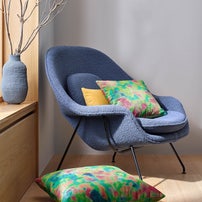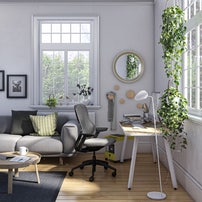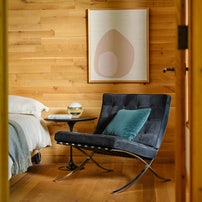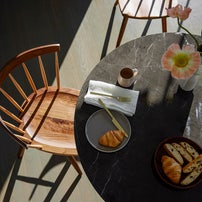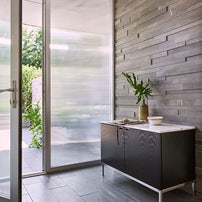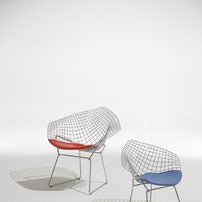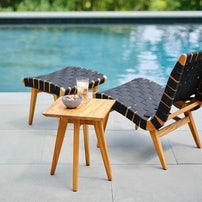Knoll Alexander Girard - Coffee Table
Alexander Girard described himself as “a reasonable and sane functionalist, tempered by irrational frivolity.” The Coffee Table, introduced to the Knoll catalog as the Model 108 in 1948, reflects the playful spirit he injected into the often austere modern vocabulary. The table was an early Knoll Classic, and is prominently featured in one of the most iconic portraits of Florence Knoll and her dog, Cartree.
Girard’s furniture and, more famously, his textile designs defined a new kind of “opulent modernism.” Often drawing inspiration from traditional folk art, his pioneering and innovative approach to design helped usher in the colors, whimsy and amoebic shapes synonymous with 1960’s America.
After a major retrospective or Girard’s work at the Cooper Hewitt National Design Museum in 2004, Knoll reintroduced the Coffee Table.
Alexander Girard described himself as "a reasonable and sane functionalist, tempered by irrational frivolity." The Model 108 Coffee Table, introduced to the Knoll catalog in 1948, reflects the playful spirit he injected into the often austere modern vocabulary.
MEASUREMENTS:
- Height: 40.6 cm / 16 inch
- Width: 149.8 cm / 59 inch
- Depth: 66 cm / 26 inch
MATERIALS:
- Top is ¾” Baltic birch core with 45 degree bevel and a Light Walnut veneer
- Legs are cold-roll steel tubes with metal weldment
HELPFUL NOTES:
- Finished in black powder coat
- Greenguard Indoor Air Quality Certified®

Alexander Girard
USA, 1907 - 1993
"Art is only art when it is synonymous with living." - Alexander Girard
One of the most prolific mid-20th century designers, Girard’s work spanned many disciplines including textile design, graphic design, typography, illustration, furniture design, interior design, product design, exhibit design, and architecture.
Born in New York City and raised in Florence, Girard was educated in Europe as an architect. He began practicing architecture and interior design in the late 1920s. Girard developed a friendship with Charles Eames in the 1940s when the two men realized they had coincidently designed almost identical modern radio cabinets and were both experimenting with plywood chairs.
Alexander Girard became director of design for Herman Miller's textile division in 1952, a time when fabrics, especially in the office, tended toward the utilitarian, drab and pattern-less. “People got fainting fits if they saw bright, pure color,” Girard commented at the time. At Herman Miller, Girard had the freedom to express himself. With primary colors, concise geometric patterns, and a touch of humor, he injected joy and spontaneity into his designs. During his tenure, he created over 300 textile designs, wallpapers, prints, furniture, and objects. Girard's work with Herman Miller continued until 1973.
Girard's reputation soared in 1959, when his colourful, whimsical interior design of the La Fonda del Sol restaurant in New York electrified the public. He designed the entire experience for the restaurant—interior, graphics, table settings and staff uniforms. In the mid 1960s Girard designed more than 17,000 different items for Braniff International Airways—from logos to uniforms to lounge furniture.
Girard's risky, sometimes iconoclastic fabrics were inspired not by a vision of the future but by a love of international folk art. His passion for what he called “toys” led him around the globe, amassing a collection of roughly 106,000 pieces. These colorful, whimsical objects inspired him, as his designs continue to inspire us.

Knoll has lived their guiding principle, "good design is good business," since 1938. Products are all created to inspire, fit, and last. The Bauhaus philosophy that furniture should complement, not compete with architecture, is central to Knoll’s design. Its extensive portfolio includes office work systems, residential mid-century modern classics, textiles, and accessories.
Designers like Harry Bertoia, Eero Saarinen, Warren Platner, Isamu Noguchi, and Florence Knoll contributed to Knoll’s iconic designs. Knoll invests in research and field studies and explores organizational behavior and technology to ensure quality excellence. As a leader in sustainability, Knoll’s practices reduce waste and conserve resources. Based in Pennsylvania, Knoll has a strong international presence, and 40 products are in the permanent collection of the Museum of Modern Art in New York.
Knoll products incur a 7.5% shipping charge at checkout, with a minimum of $85 and maximum of $500. This fee reflects White Glove Delivery for large items, which includes bringing the item to your room of choice, unpacking, removal of packaging, and assembly.
For further information on our shipping policies click here.
For further information on returns + refunds click here.


